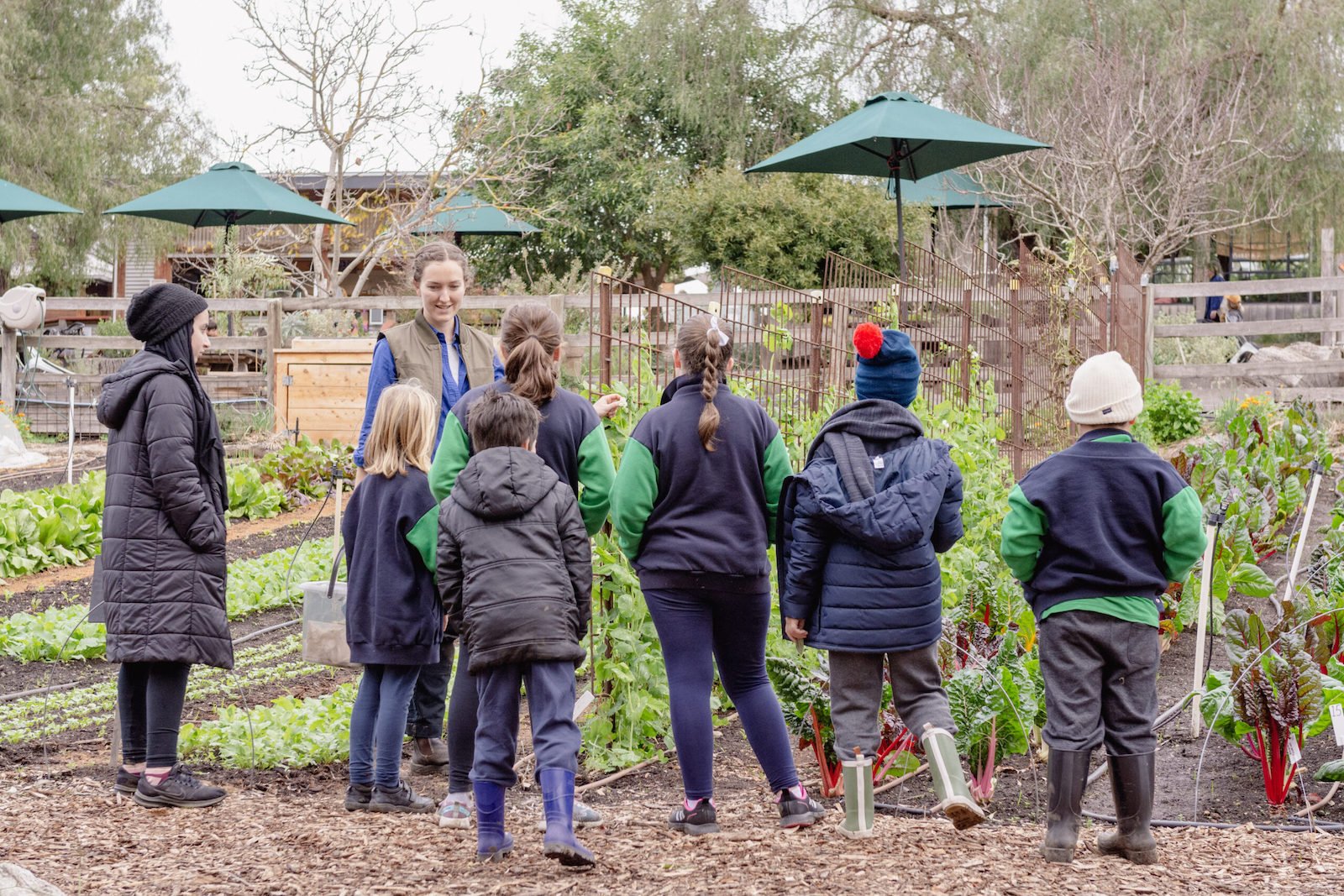School Excursions
Collingwood Children’s Farm is a not-for-profit, inner-city farm that provides green space for students and community members to grow their understanding of and connection to animals and nature. Situated on the banks of the Birrarung, the Farm promotes life-long learning towards an environmentally sustainable future and respect for the Traditional Owners of the land we farm on, the Wurundjeri Woi-wurrung people.
Designed by our on-ground educators, our Education Program is informative, engaging and interactive. Students are invited to take part in and learn about the food system and its impact on the world they live in through Farm tours and hands-on workshops aligned to the Victorian Curriculum.

Join us at the Farm!
Simply pick your preferred educational theme and the option that suits your class size (including adults) from the descriptions below and book online.
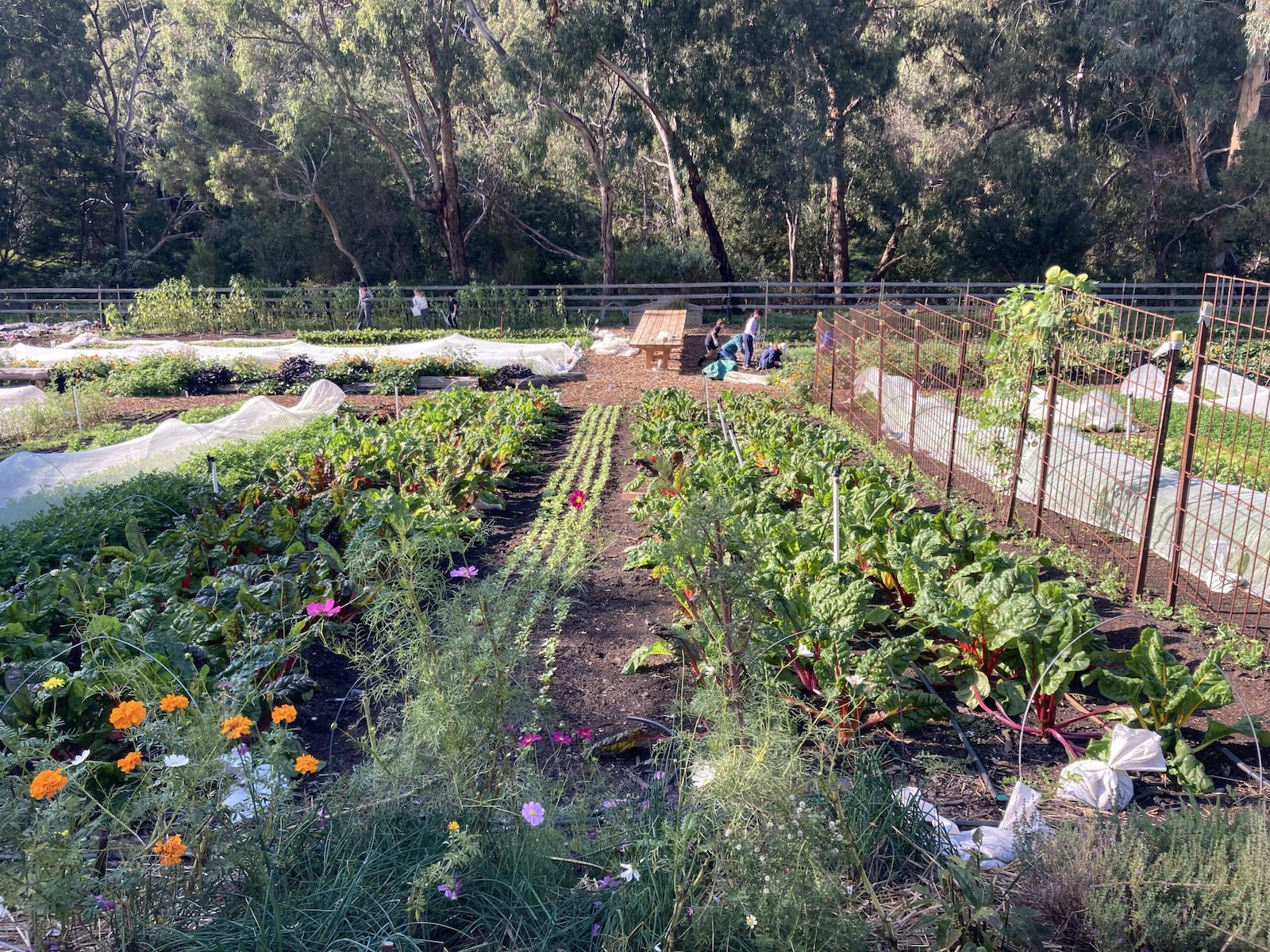
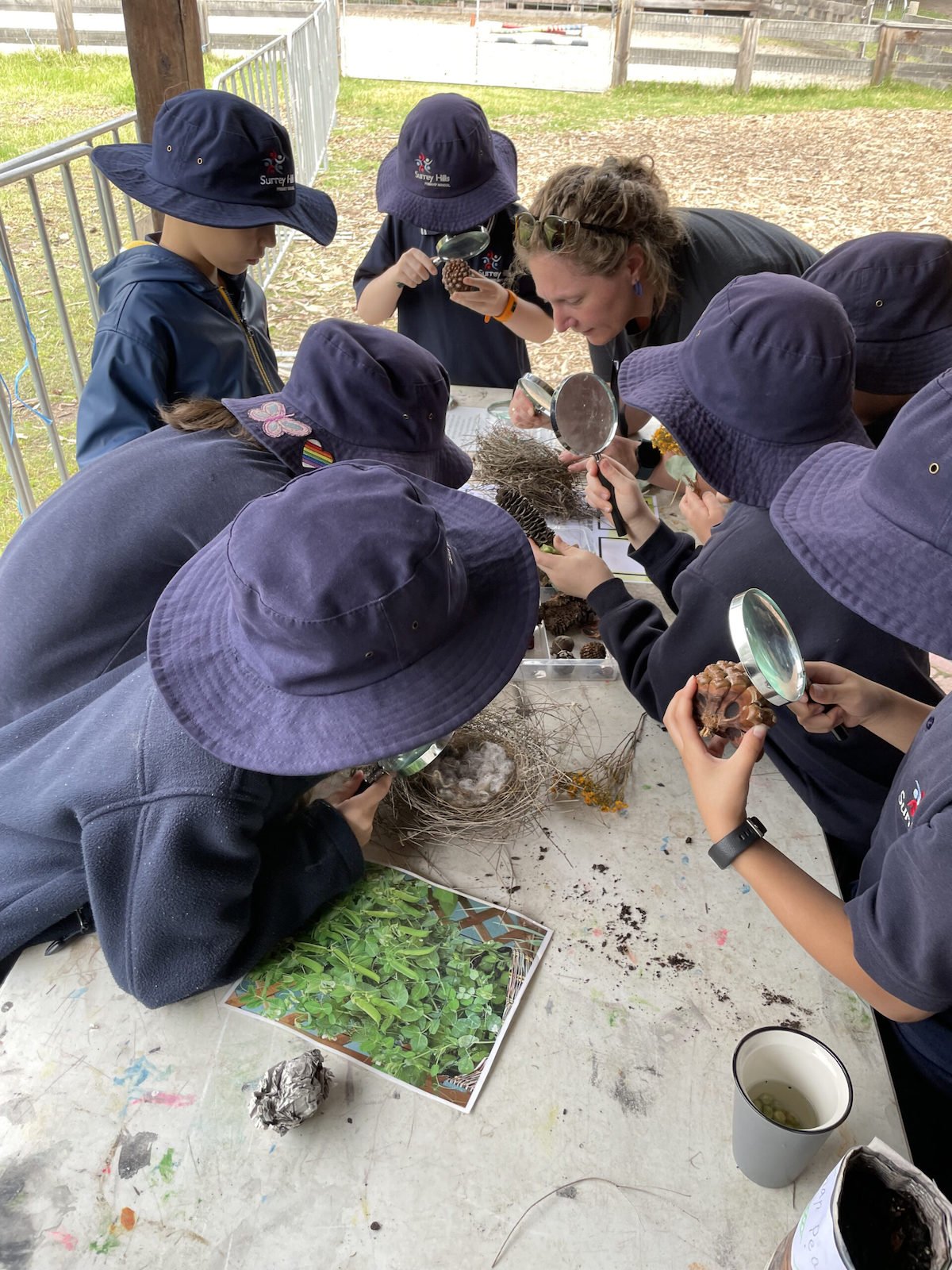
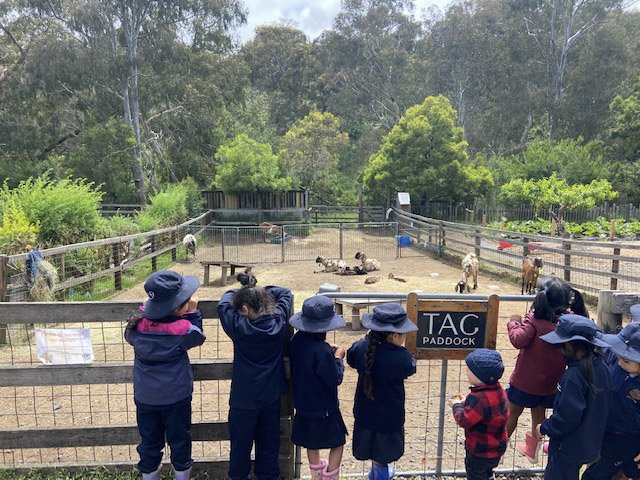


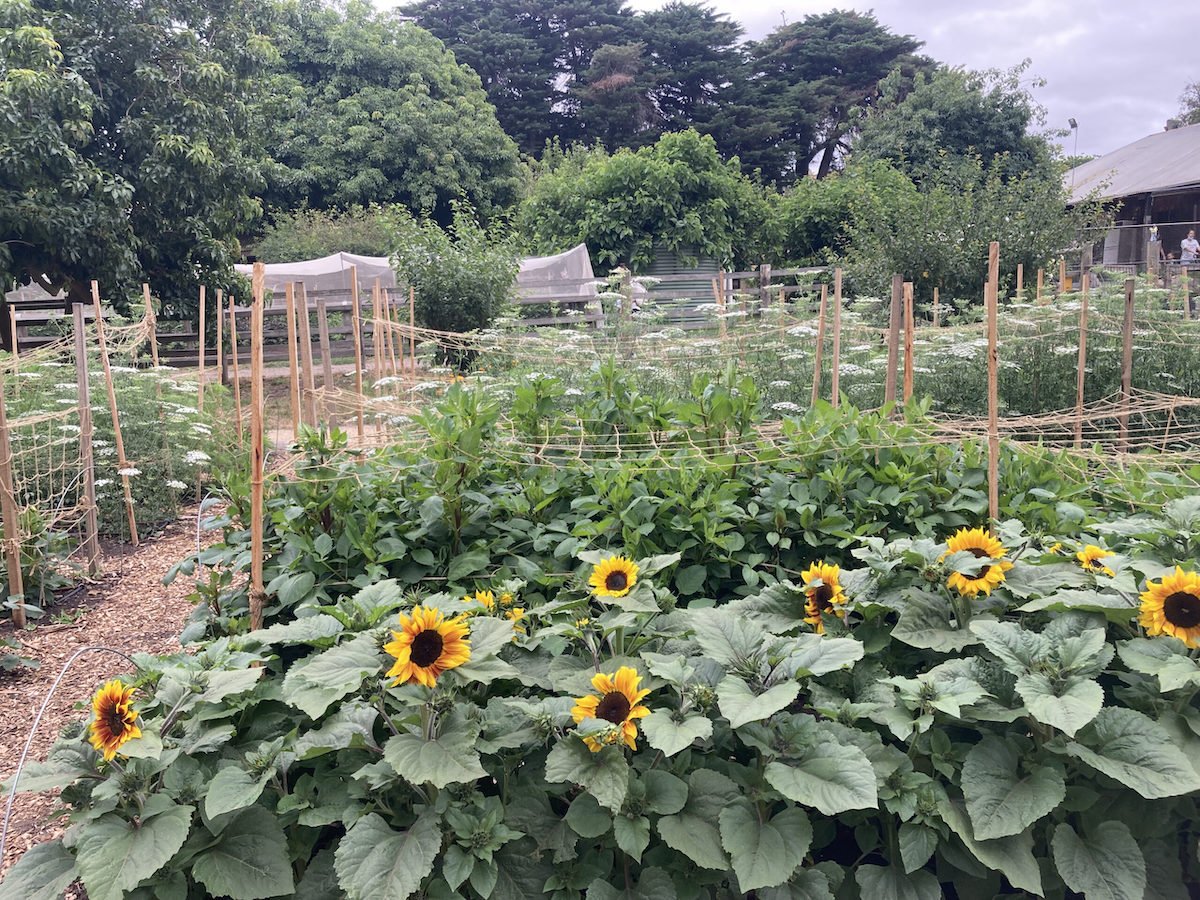

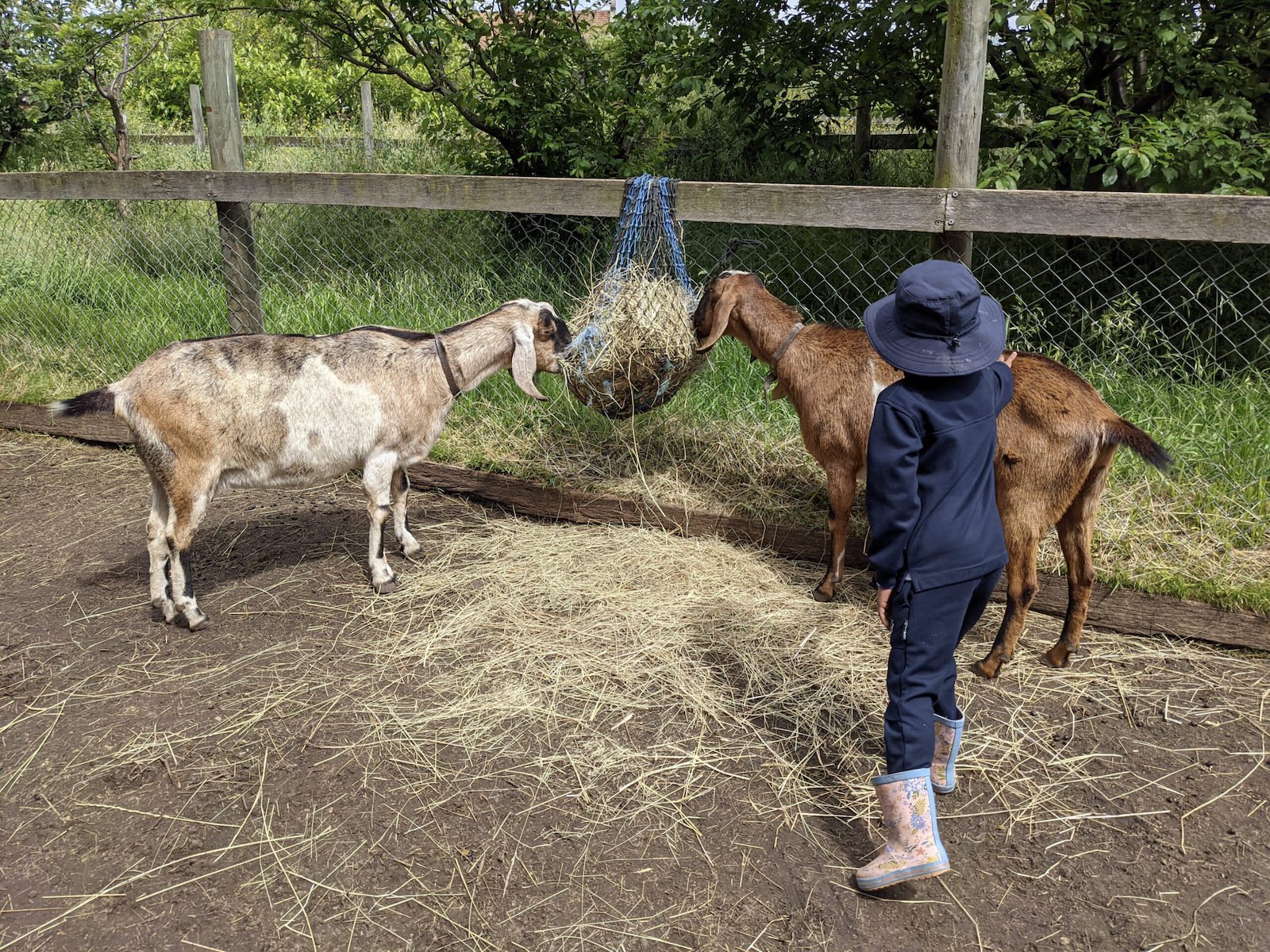

Find Your Educational Focus
Learn more about the educational themes we have on offer for school excursions and select it when you make your booking.
-
Ideal for students in Kinder and Foundation, or for those who are visiting a farm for the first time.
Animals students are likely to meet and greet include poultry, guinea pigs, sheep or goats.
What to Expect
Focus on your senses as you observe and interact with our animals. You’ll learn about the needs and characteristics of living things, while building your vocabulary to talk about the plants and animals on the Farm.
Learning Intentions
To explore the Farm using the senses.
To explore where our animals live and what they need to stay healthy as babies (seasonal) and adults.
To learn and use correct terminology for animals (and their features), plants and farm buildings.
Success Criteria
I can talk about something I smelled, felt, saw or heard.
I can name the needs of one of the animals I met. For example: food, water, friends, shelter, space to move around.
I can correctly name the animals I met today. For example: goats, kids, ducks, cows, calves, chickens, pigs, guinea pigs.
Extension: I can name different animal and plant features. For example: hooves, fur, feather, beak, stem, roots.
Victorian Curriculum Links
Science (Foundation—Level 2)
Participate in guided investigations, including making observations using the senses, to explore and answer questions (VCSIS051)
Living things have a variety of external features and live in different places where their basic needs, including food, water and shelter, are met (VCSSU042)
Living things grow, change and have offspring similar to themselves (VCSSU043)
English (Foundation Level)
Understand the use of vocabulary in familiar contexts related to everyday experiences, personal interests and topics taught at school (VCELA167)
-
Ideal for students in lower to middle primary school grades.
Animals students are likely to meet and greet include poultry, sheep and goats.
What to Expect
Learn about the lifecycles and correct terminology for animals you meet at the Farm. You’ll learn about the relationship between humans and animals, and how some animals provide food or fibres for us to use.
Learning Intentions
Learn and use correct terminology for the animals, their offspring and their features.
Identify what kind of products each animal provides. Learn how plants and animals are grown to give us food and fibre, and how these are processed for human use.
Success Criteria
I can use correct terminology or names for the animals, their offspring and their features.
I can talk about the different animal products I use in my everyday life and where they come from.
Victorian Curriculum Links
Science (Foundation—Level 2)
Living things have a variety of external features and live in different places where their basic needs, including food, water and shelter, are met (VCSSU042)
Living things grow, change and have offspring similar to themselves (VCSSU043)
Design and Technologies (Foundation—Level 2)
Explore how plants and animals are grown for food, clothing and shelter (VCDSTC015)
English (Levels 1 and 2)
Understand the use of vocabulary in everyday contexts as well as a growing number of school contexts, including appropriate use of formal and informal terms of address in different contexts (VCELA202)
Understand the use of vocabulary about familiar and new topics and experiment with and begin to make conscious choices of vocabulary to suit audience and purpose (VCELA237)
-
Ideal for students in middle to upper primary school grades.
Due to space and staff limitations, this theme is only available to book under Option B (a maximum of 60 attendees).
Sites students may visit at the Farm include: the First Nations Showcase Food Garden, Sheep Paddock, Orchard, Compost Station and Market Garden.
What to Expect
Visit and investigate different gardens, landscapes and ecosystems at the Farm, through hands-on explorations into biodiversity and soil health.
You’ll use your new knowledge to consider the ways living things rely on each other and their environments to survive, the impact humans have on the land, and how to protect the environment now and into the future.
Learning Intentions
To explore living things and their interdependence on each other and their environment.
To demonstrate an understanding of cause and effect of human activities and farming practices on the land.
Success Criteria
I can explain how living things at the Farm rely on each other to survive and thrive.
I can identify a cause and an effect of human activity on the land at the Farm.
Victorian Curriculum Links
Science (Levels 3 and 4)
Different living things have different life cycles and depend on each other and the environment to survive (VCSSU058)
Science knowledge helps people to understand the effects of their actions (VCSSU056)
Earth’s surface changes over time as a result of natural processes and human activity (VCSSU062)
Science (Levels 5 and 6)
The growth and survival of living things are affected by the physical conditions of their environment (VCSSU075)
Geography (Levels 5 and 6)
Describe and explain interconnections within places and between places, and the effects of these interconnections (VCGGC087)
Influence of people, including the influence of Aboriginal and Torres Strait Islander peoples, on the environmental characteristics of Australian places (VCGGK094)
Elaboration: farming, vegetation clearance and urban development.
Cross-curriculum Sustainability Priority
Systems
Explores the interdependent and dynamic nature of systems that support all life on Earth and our collective wellbeing.
All life forms, including human life, are connected through ecosystems on which they depend for their wellbeing and survival.
Futures
Aimed at building capacities for thinking and acting in ways that are necessary to create a more sustainable future.
Actions for a more sustainable future reflect values of care, respect and responsibility, and require us to explore and understand environments.
Sustainable futures result from actions designed to preserve and/or restore the quality and uniqueness of environments.
Make Your Booking
Bookings are made online only via Humanitix. As such, payment must be made online to secure a booking.
Please include the number of adults accompanying students on your excursion as we cannot exceed the booking capacities below.
Option A (up to three classes)
Due to space constraints, this option is only available to lower primary school students. A maximum of 90 attendees, including adults.
Minimum adult to student ratios:
Early Childhood- 1:5
Foundation-Year 2- 1:8
-
Runs across 3x one-hour sessions
Excursion duration: 4 hours
Follow the booking link for availability. -
$1188 + booking fees
-
Attendees are expected to arrive between 9:30–10 am for a strict 10:15 am start and 2 pm finish. This gives you time to check in at Reception, familiarise yourself with the facilities and have a bathroom or snack break before your excursion begins.
Late arrival may result in the shortening of activities or students missing out on rotations.
There will be time between rotations for groups to have lunch. Please bring your own food with you.
Each class rotates through three one-hour sessions covering a Farm tour, garden workshop and self-guided experience.
Your tour and garden workshop will be facilitated by a Collingwood Children’s Farm staff member.
Your tour, garden workshop and self-guided experience will relate to your chosen education theme. For Meet and Greet and Paddock to Plate excursions, your workshop will include potting up a seedling to take back to school with you.
Your self-guided experience will be supported by resources provided by staff to encourage wider exploration of the Farm.
Option B (up to two classes)
A maximum of 60 attendees, including adults.
Minimum adult to student ratios:
Early Childhood- 1:5
Foundation-Year 2- 1:8
Year 3-6- 1:10
-
Runs across 2x one-hour sessions
Excursion duration: 2.5 hours
Follow the booking link for availability. -
$792 + booking fees
-
This option is suitable for attendees with a substantial travel time to the Farm. There is flexibility under Option B for attendees to specify their excursion start time (in advance) between 10–11 am. Attendees are expected to arrive thirty minutes before their chosen excursion time for a strict start and finish. This gives you time to check in at Reception, familiarise yourself with the facilities and have a bathroom or snack break before your excursion begins.
Late arrival may result in the shortening of activities or students missing out on rotations.
There will be time between rotations for groups to have a short snack break. Please bring your own food with you.
Each class rotates through two one-hour sessions covering a Farm tour and hands-on workshop.
Your tour and workshop will be facilitated by a Collingwood Children’s Farm staff member.
Your tour and workshop will relate to your chosen education theme. For Meet and Greet and Paddock to Plate excursions, your workshop will include potting up a seedling to take back to school with you, and for Farm a Better Future excursions, your workshop will be a hands-on soil-health activity.
Option C (for one class)
A maximum of 30 attendees, including adults.
Minimum adult to student ratios:
Early Childhood- 1:5
Foundation - Year 2- 1:8
Year 3-6- 1:10
-
Runs across 1x one-hour session
Excursion duration: 1 hour
Follow the booking link for availability. -
$396 + booking fees
-
This option is suitable for attendees with a substantial travel time to the Farm. There is flexibility under Option C for attendees to specify their excursion start from the following options (in advance): 10.15 am, 11.15 am or 1.45 pm. Attendees are expected to arrive thirty minutes before their chosen excursion time for a strict start and finish. This gives you time to check in at Reception, familiarise yourself with the facilities and have a bathroom or snack break before your excursion begins.
Late arrival may result in the shortening of activities.
There will be time after your tour or workshop for the group to have a snack or lunch. Please bring your own food with you.
Your class completes a one-hour session covering a Farm tour or a hands-on workshop. Your group will then be free to explore the rest of the Farm independently at your leisure.
Your tour or workshop will be facilitated by a Collingwood Children’s Farm staff member.
Your tour or workshop will relate to your chosen education theme. For Meet and Greet and Paddock to Plate excursions, your workshop will include potting up a seedling to take back to school with you.
Once you’ve made your booking, we’ll send you a teacher resource to support further learning and a document that outlines the key logistical, behavioural and safety information to read and understand before your visit. If you are booking on behalf of a school, please ensure that the staff attending the booking receive this document so that they can arrive prepared.
A discussion with students about interacting with animals in a calm and safe manner is encouraged to ensure everyone enjoys their visit to the Farm.
Please read the Supporting Documents, which includes guidance for teachers’ risk assessments and the Terms and Conditions below.
If you have any questions, our friendly Reception team can help you.
Thank you for your support!
Your booking helps us to fund and care for the animals, land and programs that make Collingwood Children’s Farm a place for community through social inclusion.


